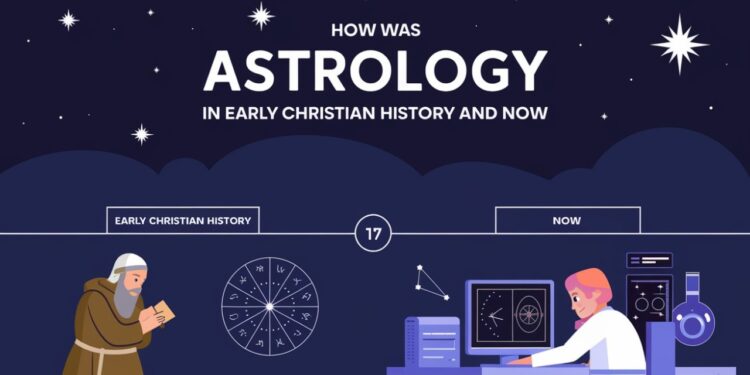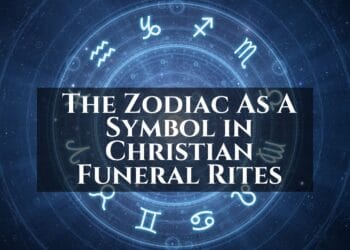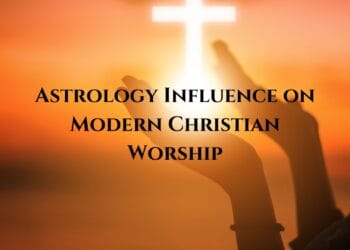No products in the cart.
How Was Astrology In Early Christian History and Now
This post contains paid and/or affiliate links. I make a small commission at no extra cost to you. Please see our Privacy Policy.
Astrology has a long history that connects with many cultures, including Christianity. In early Christian times, astrology played a complex role. It was seen through different lenses of acceptance and rejection. This relationship gives us insight into how these two domains affected each other over time.
Astrology’s Place in Early Christian Context
In the early days of Christianity, astrology was common in many cultures. People following this religion had to deal with old beliefs and new views of the cosmos. Key aspects of Christianity at this time included:
- Common Beliefs: Many early Christians came from backgrounds steeped in astrological beliefs. They often saw celestial bodies as influencing human affairs.
- Integration and Conflict: Early Christian leaders had to deal with astrology’s popularity. Some saw it as a way to understand God’s plan, while others saw it as pagan.
- Interpretation of Scriptures: Biblical references to stars and celestial events were closely examined. Some saw these as affirmations of astrology’s significance, while others rejected them.
The Influence of Historical Figures
Several early Christian theologians shaped the view of astrology within the church:
- Saint Augustine: Initially fascinated by astrology, Augustine later condemned it, saying it undermined God’s power.
- St. Jerome: He criticized astrological notions, seeing them as against faith. His writings helped solidify astrology’s stance as against true Christian doctrine.
- Other Influential Figures: Many church fathers debated astrology’s validity, with some denying any divine influence from celestial bodies.

Astrology’s Decline in Acceptance
As Christianity grew stronger, its approval of astrology decreased. Several factors led to this decline:
- Development of Doctrine: The establishment of core doctrines emphasized faith over celestial influences.
- Emergence of Scholasticism: This intellectual movement questioned traditional beliefs, including astrology, paving the way for a more empirical understanding of the world.
- Growth of Church Power: The church sought to consolidate its influence, leading to the demonization of practices seen as competing with its teachings.
Modern Perspectives on Astrology
Today, astrology has seen a resurgence of interest, moving away from its early Christian ties. Several factors contribute to its modern appeal:
- New Age Movement: Many individuals turn to astrology for personal insight and self-discovery.
- Social Media Influence: Platforms like Instagram and TikTok have popularized astrology, making it accessible to younger audiences.
- Cultural Relevance: Astrological content is now intertwined with pop culture, often appearing in entertainment and lifestyle discussions.
The modern landscape shows different views of astrology compared to early Christian views. It has evolved from a tool for revealing divine secrets to a source of guidance for self-exploration.
ADVERTISEMENT
Astrology’s Ongoing Debate
Even now, astrology is a topic of heated discussion. Some see it as a legitimate tool for understanding oneself and the universe, while others remain skeptical:
- Advocates: They argue that astrology offers valuable insights into personality and life events.
- Skeptics: They dismiss astrology as superstition, arguing that it lacks scientific validity.
Reflecting on astrology’s role in early Christian beliefs and practices, we see how perspectives have changed over time. Recognizing the historical context helps us appreciate the challenges and adaptations that have shaped today’s diverse attitudes toward astrology.
Key Historical Figures in the Intersection of Christianity and Astrology
The intertwining of Christianity and astrology has seen many notable figures throughout history. These individuals navigated complex beliefs and ideas. Their contributions shed light on the influence of both disciplines on each other.
Early Christian Thinkers
In the early days of Christianity, several key figures tried to mix astrological beliefs with Christian teachings. Some made significant contributions.
- Saint Augustine (354–430 AD): A leading theologian, Augustine studied astrology but later rejected it. He believed in the power of faith over astrological predictions. His writings showed that divine will is more important than the stars.
- Isidore of Seville (c. 560–636 AD): A scholar and archbishop, Isidore wrote about astrology in his works. He tried to combine knowledge from different fields, like astronomy and astrology, within Christianity. This showed an early openness to astrological ideas.
- Boethius (c. 480–524 AD): A philosopher who connected classical thought with Christianity, Boethius wrote about fate and free will. He saw the heavens’ influence but stressed divine Providence. This showed a struggle between astrology and Christian beliefs.
Medieval Scholars and Their Contributions
In the medieval period, the link between astrology and Christianity kept changing. Scholars tried to make them work together, leading to different views.
- Thomas Aquinas (1225–1274): A key thinker, Aquinas tried to merge astrology with the Bible. He saw the stars’ impact but believed God controls everything. His views allowed for some acceptance of astrology in Catholic teachings.
- Hildegard of Bingen (1098–1179): A mystic and writer, Hildegard saw astrology as a way to understand God’s creation. She thought studying the stars could deepen our knowledge of the divine.
- William of Auvergne (c. 1180–1249): A theologian who liked astrology, William thought it could reveal moral truths. He believed knowing celestial influences could help people be virtuous.
Renaissance Thinkers and the Resurgence of Astrology
The Renaissance saw a renewed interest in astrology, thanks to the rediscovery of ancient texts. Many famous people explored astrological ideas, mixing them with new scientific views.
- Johannes Kepler (1571–1630): A leading astronomer and astrologer, Kepler linked his discoveries with astrology. He believed in a universe where stars influence human life. His works tried to connect predestination and free will.
- Catherine de’ Medici (1519–1589): As a powerful queen in France, Catherine used astrologers for advice. She used astrology to justify her actions and keep power, showing astrology’s role in royal life.
Modern Context
Today, the mix of Christianity and astrology is interesting. Many Christians see astrology as against their faith, while some use it spiritually. Opinions vary widely among people and churches.
Today, figures like New Age leaders mix Christian ideas with astrology. This shows a shift towards a more open view. The legacy of historical thinkers continues to shape today’s practices.
Key Takeaways from Historical Figures
| Historical Figure | Time Period | Significant Contribution |
|---|---|---|
| Saint Augustine | 354–430 AD | Rejected astrology in favor of divine will. |
| Isidore of Seville | c. 560–636 AD | Integrated astrological themes in Christian writings. |
| Thomas Aquinas | 1225–1274 | Examined fate versus free will in relation to astrology. |
| Johannes Kepler | 1571–1630 | Explored connections between astronomy and astrology. |
Exploring the history of Christianity and astrology shows a complex mix of views. This ongoing debate gives us deep insights into our beliefs about the universe and our role in it.
The Evolution of Astrology’s Acceptance in Christian Thought
Astrology and Christianity have had a complex relationship over time. This has been influenced by culture, theology, and history. Early Christian views on astrology ranged from acceptance to outright rejection.
In the early Christian era, church fathers had different opinions on astrology. Some, like Saint Augustine, were skeptical. He believed that while the stars might influence us, they don’t control our fate. Augustine thought astrology conflicted with God’s sovereignty.
On the other hand, some scholars accepted certain astrological ideas. For example, the idea that the stars influence us was sometimes seen as part of Christian thought. This was true in the early Middle Ages, when scholars like Boethius wrote about the celestial order and its role in divine providence.
This mixed view continued through the Middle Ages and into the Renaissance. During this time, figures like Johannes Kepler were both astronomers and astrologers. They tried to link astrological ideas with Christian teachings, seeing the stars as created by God for a purpose. This period saw a deeper understanding of how astrology could fit with Christianity.
ADVERTISEMENT
But with the Enlightenment in the 17th and 18th centuries, skepticism about astrology grew. This era valued reason and science over mystical views of the stars. By then, many Christian scholars saw astrology as superstition. This change marked a big shift in how astrology was viewed in Christianity.
Today, views on astrology vary widely in Christianity. Some reject it, seeing it as against their faith. Others see it as a tool for self-reflection or personal growth, not as a guide for life.
In modern spiritual practices, astrology is often combined with Christian mysticism and other spiritual traditions. This mix raises questions about astrology’s place in Christianity. For many, astrology offers a special way to talk about personal and spiritual matters. As society becomes more open to different spiritualities, the debate about astrology in Christianity continues.
The debate between faith and astrology varies across cultures and individuals. Here are some points reflecting the contemporary landscape:
- Rejection: Many Christian leaders openly reject astrology, saying it goes against biblical teachings. They believe God is the only source of truth and guidance.
- Acceptance: Some believers see astrology as a tool to understand themselves and their paths. They argue that it can offer insights into God’s creation.
- Reinterpretation: Certain groups try to make astrological ideas fit with Christian teachings. They focus on the spiritual meanings behind astrological signs, not on determinism.
- Indifference: Many Christians don’t care about astrology, seeing it as not relevant to their faith. They focus on their spiritual practices instead.
Modern Perspectives: Astrology and Christianity Today
Today, many people are exploring how astrology and Christianity fit together. This leads to interesting talks about their coexistence and influence. Some see astrology as a tool for self-discovery, while others are skeptical due to religious teachings.
Historical Overview of Astrology in Christianity
In early Christian times, astrology had a complicated relationship with faith. Some Church Fathers, like Tertullian and St. Augustine, rejected astrology. They saw it as opposing Christian teachings. Yet, many early believers tried to merge their faith with astrological views.
Modern Acceptance of Astrology
Nowadays, astrology’s popularity is growing, and Christians are rethinking its role. A shift has happened as people learn more about astrology. Here’s how many view it today:
- Personal Insight: Many see astrological charts as a tool for personal growth, giving insights into their personalities and life paths.
- Spiritual Exploration: For some, astrology is a way to explore spirituality. They see astrological signs as part of a divine plan.
- Cultural Influence: Astrology is everywhere in media, from horoscopes to social media. This makes it appealing to more people.
Balancing Faith and Astrology
While some Christians accept astrology, others find it hard to balance their faith with interest in the stars. Here are some views they share:
Cautious Acceptance
Many Christians are cautious, seeing value in astrological insights but not fully committing. They enjoy astrology for fun or personal growth, while keeping their faith first. This way, they can appreciate astrology without conflict with their beliefs.
Rejecting Astrology
On the other hand, some Christians reject astrology, seeing it as against their faith. They believe in trusting divine guidance more than astrological predictions. For them, astrology feels like a betrayal of their faith.
Integrative Approach
Others try to blend astrology with their Christian beliefs. They see the stars and planets as reflecting God’s creation. This view encourages a dialogue between faith and celestial insights.
The Role of Community
The community greatly influences views on astrology. Churches, small groups, or online forums are where discussions happen. Here’s how community impacts individual views:
- Sharing Experiences: Personal stories and testimonies can spark discussions about astrology in faith communities, leading to acceptance.
- Education and Awareness: Workshops or study groups on astrology can educate believers, promoting understanding and acceptance.
- Support for Exploration: Communities that support exploration without judgment encourage curiosity about astrology and faith.
Astrology’s Future Among Christians
The future of astrology’s acceptance among Christians is uncertain. Social media and the internet have made astrology more accessible. As people explore connections between their spiritual beliefs and astrological insights, discussions will likely continue to evolve.
Reflecting on your beliefs, consider how astrology shapes your understanding of yourself and your relationship with the divine. Whether embracing it, being cautious, or rejecting it, being informed and open-minded enriches your spiritual journey.
This journey is a quest for understanding and meaning, providing many opportunities to learn from each other. The interplay of astrology and Christianity continues to captivate and challenge people of faith worldwide.
How Astrology Influences Spirituality in Contemporary Society
In today’s world, astrology is a big part of many people’s lives. It influences their spirituality in many ways. This ancient practice connects deeply with people, giving them insights and guidance. Let’s dive into why astrology and spirituality are so intertwined.
Understanding Astrology’s Role in Spirituality
Astrology is like a map of your personality and life path. It helps people understand themselves and the energies around them. This belief fits well with spiritual ideas about self-awareness and growth. Here are some key points about the connection between astrology and spirituality:
- Self-Reflection: Astrology encourages people to think about their traits and behaviors. This journey inward helps them understand themselves better.
- Connection to the Universe: Many see astrology as a way to connect with the universe. This feeling of belonging is uplifting.
- Guidance in Decision-Making: Astrology offers insights that help with making life choices. This aligns with spiritual principles of following one’s true path.
Astrology as a Tool for Spiritual Growth
In today’s society, people look for tools to grow personally and spiritually. Astrology is one of these tools. Here are several ways astrology helps with spiritual growth:
- Personalized Insights: Birth charts reveal unique aspects of an individual’s character. This scientific approach leads to personalized spiritual practices.
- Timing and Intention: Astrological events, like retrogrades or full moons, help set intentions. This enhances spiritual practices.
- Community Engagement: Astrology brings like-minded people together. This fosters a sense of belonging and spiritual connection.
The Influence of Social Media
The rise of social media has changed how we see and practice astrology. Platforms like Instagram, TikTok, and YouTube are full of astrology content. This digital age has made astrology more accessible. Here are some notable points:
- Increased Accessibility: Social media makes astrological insights easy to find. People can quickly get personalized readings without needing to know a lot.
- Viral Trends: Astrology memes and videos spark discussions about zodiac signs. This allows people to share experiences and engage with spirituality in a fun way.
- Influencers and Communities: Astrology influencers create communities for spiritual exploration. This online support system helps people connect over shared beliefs and practices.
Astrology in Wellness Practices
Astrology has become a part of many wellness practices. It adds depth to spiritual rituals for many people. Here’s how:
| Wellness Practice | Astrological Influence |
|---|---|
| Meditation | People use planetary alignments to focus their meditation. This enhances their spiritual experience. |
| Yoga | Certain astrological signs are linked to specific chakras. Practicing yoga with these in mind can deepen the experience. |
| Journaling | Many use astrological insights to guide their journaling. They reflect on personal growth and challenges. |
The Future of Astrology and Spirituality
As we move forward, astrology and spirituality will likely grow together. More people are interested in self-knowledge. Astrology will continue to be a spiritual guide for many.
So, the next time you explore your astrological sign or consult your birth chart, think about how it guides your spiritual journey. Astrology offers a unique way to view your personal path in a complex universe.
Conclusion
Astrology’s journey through early Christian history is complex. It was shaped by beliefs, practices, and key figures. Initially, astrology was a big part of many early Christians’ lives.
As Christianity evolved, its view on astrology changed. It became more critical, trying to distance itself from the practice. Figures like St. Augustine and Ptolemy played a big role in this shift.
Today, there are many views on astrology within Christianity. Some see it as a useful tool for personal insight. Others are skeptical, seeing it as incompatible with their faith. This shows the ongoing debate about astrology’s place in spirituality.
In today’s society, astrology influences many people. It helps them understand themselves and their spirituality. It’s a bridge for those seeking meaning in their lives. Astrology and Christianity have shaped spiritual practices, giving us unique insights into the human experience.













